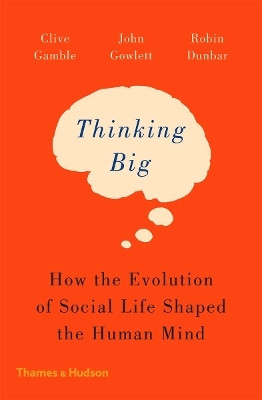
Thinking Big
Thames & Hudson Ltd (Verlag)
978-0-500-29382-9 (ISBN)
When and how did the brains of our hominin ancestors become human minds? When and why did our capacity for language or art, music and dance evolve? It is the contention of this pathbreaking and provocative book that it was the need for early humans to live in ever-larger social groups, and to maintain social relations over ever-greater distances – the ability to ‘think big’ – that drove the enlargement of the human brain and the development of the human mind. This ‘social brain hypothesis’, put forward by evolutionary psychologists such as Robin Dunbar, one of the authors of this book, can be tested against archaeological and fossil evidence, as archaeologists Clive Gamble and John Gowlett show in the second part of Thinking Big. Along the way, the three authors touch on subjects as diverse and diverting as the switch from finger-tip grooming to vocal grooming or the crucial importance of making fire for the lengthening of the social day. As this remarkable book shows, it seems we still inhabit social worlds that originated deep in our evolutionary past – by the fireside, in the hunt and on the grasslands of Africa.
Clive Gamble is a British archaeologist and anthropologist, and Professor of Archaeology at Southampton University. He has been described as the 'UK’s foremost archaeologist investigating our earliest ancestors'. John Gowlett is Professor of Archaeology, Classics and Egyptology at Liverpool University. He is involved in fieldwork in eastern and southern Africa. Robin Dunbar is a British anthropologist and evolutionary psychologist specialised in primate behaviour. He is currently head of the Social and Evolutionary Neuroscience Research Group in the Department of Experimental Psychology at the University of Oxford. He is best known for formulating Dunbar's number, a measurement of the 'cognitive limit to the number of individuals with whom any one person can maintain stable relationships'.
Preface • 1. Psychology Meets Archaeology • 2. What It Means to Be Social • 3. Ancient Social Lives • 4. Ancestors With Small Brains • 5. Building the Human Niche: Three Crucial Skills • 6. Ancestors with Large Brains • 7. Living in Big Societies
| Erscheinungsdatum | 15.03.2018 |
|---|---|
| Zusatzinfo | with 57 illustrations |
| Verlagsort | London |
| Sprache | englisch |
| Maße | 130 x 198 mm |
| Gewicht | 240 g |
| Themenwelt | Geisteswissenschaften ► Archäologie |
| Geschichte ► Allgemeine Geschichte ► Vor- und Frühgeschichte | |
| Geschichte ► Allgemeine Geschichte ► Altertum / Antike | |
| Geschichte ► Teilgebiete der Geschichte ► Kulturgeschichte | |
| Naturwissenschaften ► Biologie ► Evolution | |
| Sozialwissenschaften ► Soziologie | |
| ISBN-10 | 0-500-29382-1 / 0500293821 |
| ISBN-13 | 978-0-500-29382-9 / 9780500293829 |
| Zustand | Neuware |
| Haben Sie eine Frage zum Produkt? |
aus dem Bereich


